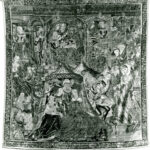Jean Scot Erigene, also known as John Scotus Eriugena, was an influential philosopher, theologian, and translator who lived during the 9th century. He is best known for his work in the field of metaphysics and his translations of Greek philosophical texts into Latin. Erigene’s innovative ideas and intellectual contributions played a significant role in the development of medieval philosophy.
Early Life and Education
Jean Scot Erigene was born in Ireland, possibly around the year 800. Little is known about his early life, including his exact place of birth and his family background. However, it is believed that he received his education in Irish monastic schools, which were renowned centers of learning during that time.
Translator and Scholar
Erigene’s greatest contribution to philosophy and theology was his translation of Greek texts into Latin. He was fluent in both languages, which allowed him to access and interpret important works of Greek philosophy that were largely unavailable in the Latin-speaking Western Europe at the time. Erigene translated numerous works by Pseudo-Dionysius the Areopagite, a significant figure in Christian mysticism, and his translations introduced mystical and Neoplatonic ideas to the Latin-speaking world.
Philosophical System
Erigene’s philosophical system was heavily influenced by Neoplatonism, a school of thought that combined elements of Platonism with other philosophical traditions, particularly those of the Hellenistic era. His most famous work, “Periphyseon” or “De divisione naturae” (On the Division of Nature), is a comprehensive treatise that explores various philosophical topics, including the nature of God, the universe, and human existence. In this work, Erigene proposed a metaphysical framework that encompassed both the created and uncreated realms and emphasized the unity of all things.
Controversies and Influence
Erigene’s philosophical ideas often challenged prevailing theological doctrines of his time, leading to controversy and criticism from both secular and religious authorities. Some of his views were perceived as pantheistic or heretical, and his works were condemned by Church officials. However, Erigene’s influence extended beyond his own lifetime, as his writings inspired subsequent generations of philosophers and theologians, particularly those associated with the twelfth-century School of Chartres and the later Christian mystical tradition.
Legacy
Despite facing opposition during his lifetime, Jean Scot Erigene’s ideas continued to resonate in later centuries. His work influenced major figures in medieval philosophy, such as Meister Eckhart and Nicholas of Cusa, and his ideas on the nature of God and the universe laid the foundation for later mystical and pantheistic traditions. Erigene’s translations of Greek texts played a crucial role in the transmission of ancient wisdom to the Latin-speaking West, preserving and disseminating important philosophical and theological ideas.
Jean Scot Erigene’s intellectual contributions and translations have had a lasting impact on Western thought. His exploration of metaphysical concepts and his integration of diverse philosophical traditions continue to inspire scholars and philosophers to this day.
Sources
Encyclopedia Britannica. John Scotus Erigena.
Stanford Encyclopedia of Philosophy. John Scottus Eriugena.
Copleston, F. C. A History of Philosophy: Volume II, Medieval Philosophy—From Augustine to Duns Scotus. Doubleday, 1993
[3] Copleston, F. C. A History of Philosophy: Volume II, Medieval Philosophy—From Augustine to Duns Scotus. Doubleday, 1993.







